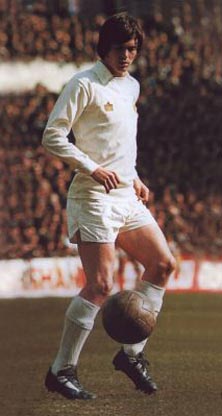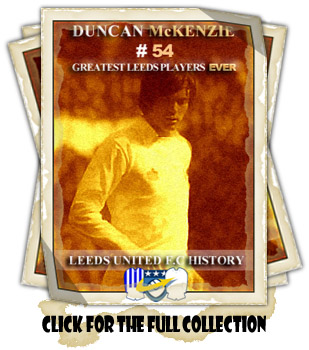

McKenzie: Duncan
1974-1976
(Player Details)
Forward
Born: Grimsby: 10-06-1950
Debut: v Liverpool (Wembley) (Substitute): 10-08-1974
5’8” 11st 3lb (1975)
#54 in 100 Greatest LUFC Players Ever

McKenzie learnt the game at Old Clee Junior School and played for Notre Dame in the
mornings and Old Clee in the afternoon in the local Sunday League. He did not play
representative football but there was interest from Grimsby Town, Tottenham Hotspur and
Arsenal, but nothing materialised. His break came when Notre Dame faced a Nottingham Forest
Junior team and his talents were spotted by one of their scouts and he was invited for
trials with Forest. He joined the Nottingham Forest Ground Staff, where he turned
professional in July 1968. After two loan spells with Mansfield Town in March 1970, when he
played ten League games, three as a substitute, and scored three goals for the Stags, and
February 1973, when his stop at Field Mill yielded seven goals in six League appearances, he
won a regular place at Forest. During his brief reign as Leeds boss, Brian Clough spent
£240,000 in August 1974 to bring McKenzie to Elland Road, and was the only one of his
signings to subsequently flourish at the club. At the City Ground McKenzie made one hundred
and eleven League appearances, six being as a substitute, scoring forty-one goals. He spent
seven years there and his memory lived long for those who were lucky enough to be entertained
by him. Clough was soon forced to depart but McKenzie stayed to become the idol of the Leeds
crowd, who loved his style. Initially, he attracted media attention for his achievements
outside of the game, which included the ability to jump over a parked car, and to throw a
golf ball the length of a football pitch. However, once established in the Leeds side, he
soon attracted attention for the quality of his footballing skills. A dazzling showman
forward, he became one of the most popular players ever at Elland Road with his highly
individual skills which brought some stunning and spectacular goals. Despite finishing top
scorer in 1975-76, with sixteen goals in thirty-nine matches, he was sold to Anderlecht in
the summer of 1976 for £200,000. McKenzie was a sublimely talented individual, capable of
running rings around the most astute of defenders. However, despite his skills, he could be
an immensely frustrating player to play with. Whilst he reserved his finest moments for big
games, he was often anonymous against lesser opposition. It was this inconsistency that
caused him to be sold to the Belgian side. After sixteen goals in thirty games with the
Belgian club, another £200,000 move took him to Everton in December 1976. Unfortunately for
McKenzie, the manager who signed him, Billy Bingham, was sacked and replaced by Gordon Lee
just a month later. McKenzie and Lee had their differences, with the result that McKenzie
didn't have as free a role as would have suited him. This led to his departure from Everton,
but not before he had turned in some admirable performances, a notable game being the 1977
FA Cup Semi-Final against Liverpool. Despite forming a lively strike partnership with Bob
Latchford, he was sold to Chelsea and replaced by big-money flop Mickey Walsh. But the
Everton fans didn’t forget their hero. He returned to Goodison with his new employers just
six weeks later. He opened the scoring for Chelsea and was greeted with as loud a roar as if
he’d still been wearing royal blue. He scored fourteen goals in forty-eight League games
with the Goodison club. He went to Chelsea in September 1978 for £165,000, where, much like
the rest of his career, he dazzled the fans with his skills and eccentricity but still failed
to make the most of his talents. He left the club less than a year later having made just
fifteen League appearances and scored four goals. He left for Blackburn Rovers in March 1979
for £80,000 where he scored sixteen goals in seventy-four League games. In 1981, he spent a
single season, his last as a professional footballer, playing in the NASL with Tulsa
Roughnecks, who paid £80,000 for his services, scoring fourteen times in thirty-one games,
as well as one game without scoring in the Indoor League, and Chicago Sting, where he netted
three goals in twenty games. Despite his undoubted skill, he was never capped by England, the
nearest he came was when Don Revie requested his services for a Don Revie XI, essentially an
England trial squad, for Johnny Giles' testimonial game in Dublin. He was remembered by all
those who saw him play as a wizard with the ball and a healthy goals-to-game ratio, with over
a hundred goals in just over three hundred appearances. After a spell in Warrington Sunday
League football he went to Hong Kong in March 1983, where he played with Ryoden for four
months and later helped run a football community programme in Liverpool. He broadcast at
Radio Merseyside, and wrote a column for the Liverpool Echo. He became a noted after-dinner
speaker and has written on football for national newspapers and worked as a summariser on
radio.